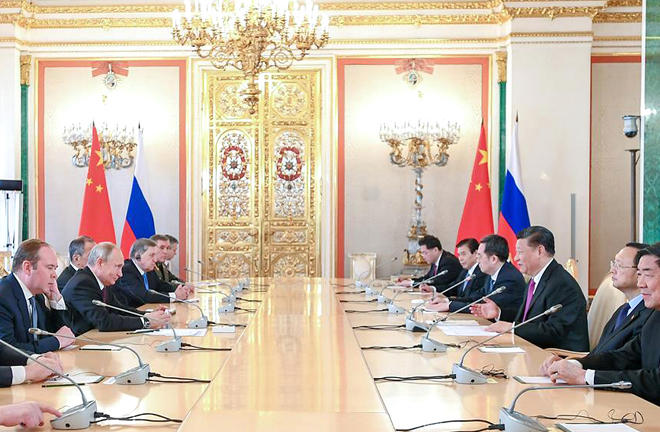China, Russia agree to upgrade relations for new era

Chinese President Xi Jinping and his Russian counterpart Vladimir Putin hold talks at the Kremlin on June 5 in Moscow, Russia. Photo: Xie Huanchi /XINHUA
China and Russia agreed on June 5 to upgrade their relations to a comprehensive strategic partnership of coordination for a new era.
The decision was made at a meeting between visiting Chinese President Xi Jinping and his Russian counterpart, Vladimir Putin.
Xi and Putin signed statements on elevating bilateral ties to the comprehensive strategic partnership of coordination for a new era and on strengthening contemporary global strategic stability on June 5 in Moscow.
On the occasion of the 70th anniversary of the establishment of diplomatic relations between the two countries, against the backdrop of a complicated international situation, China and Russia have deepened mutual trust and cooperation, upgrading bilateral relations.
Xi and Putin’s signing of the statement on elevating bilateral ties to the comprehensive strategic partnership of coordination for a new era marked an upgrade of the relationship between the two countries, said Sun Zhuangzhi, director of the Institute of Russian, Eastern European and Central Asian Studies at the Chinese Academy of Social Sciences.
China-Russia relations have become a model of friendly cooperation between major countries and neighboring countries, Sun said. Maturity, stability and predictability are important features of China-Russia relations. The Chinese and Russian governments have established many communication mechanisms and channels for peaceful and respectful negotiation.
Sun Jingxin, an associate research fellow from the Contemporary China and World Research Institute at China Foreign Languages Publishing Administration, said that after 70 years of evolution, China-Russia relations have become more mature, stable and tenacious, and they have received increasing attention from the international community. Practice has proven that the high-level development of China-Russia relations has effectively safeguarded the nations’ sovereignty, security and development interests, as well as the peace, stability and prosperity of the world.
The statement on strengthening contemporary global strategic stability is of special significance at present. Sun Zhuangzhi said that in light of rapid changes in the international situation, China-Russia cooperation has a particularly important strategic significance and plays an important role in promoting regional and global stable development.
As two major countries, China and Russia have the responsibility to maintain international strategic stability and build a new, fairer and more just international order, said Zhao Huasheng, a professor from the School of International Relations and Public Affairs at Fudan University. This involves both the interests of the two countries and their common responsibility.
In recent years, China-Russia relations have maintained steady development amid changes in the international and regional situations, which indicates that the two countries have the same basic understanding of their bilateral relations, Zhao continued.
At present, exchanges between Chinese and Russian think tanks are increasing and the quality is constantly improving. Before Xi’s visit to Russia, think tanks of the two countries jointly organized a series of seminars with complementary themes.
Zhao said that think tanks of the two countries can conduct in-depth discussions and exchanges on major issues shared by China and Russia, the development of bilateral relations, and potential difficulties. Think tank exchange should enhance mutual trust and cooperation and put forward constructive policy recommendations to truly convey the voices of both societies and their academic circles.
Sun Jingxin said it is necessary to carry out key research on the connection between the Belt and Road initiative, the Eurasian Economic Union, and the Greater Eurasian Partnership. In addition, it is necessary to carry out forward-looking research on the new type of major-country relationship between China and Russia.
edited by JIANG HONG

 PRINT
PRINT CLOSE
CLOSE